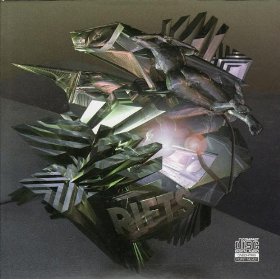It’s the end of a decade that produced few solid cultural movements of any stature and a whole lot of flux. Music culture dropped its pretensions to the forming of grand narratives and dissolved back into history, and the subsequent emissions came back like shifting memories and simulacra of the past, echoes of yesterday whizzed up in history’s blender. But what’s really weird is, it didn’t feel like this was all for nothing. Just that in this new landscape, we needed a different kind of navigator.
Daniel Lopatin might be one such navigator. A Brooklyn-based writer, musician and collector of vintage synths, Lopatin is one-third of Infinity Window, one whole of Oneohtrix Point Never, and a key player in a post-noise scene – see also, Emeralds, Stellar Om Source, James Ferraro – dedicated to traversing territory last explored by the kosmische travellers of yore: Tangerine Dream, Klaus Schulze, Vangelis, Edgar Froese. In recent years, the gentle side of cosmic exploration has been sidelined in favour of more muscular, technique-powered examples of the progressive age. But of course, this music had found its way into the culture anyway, in a mediated form at least – as soundtrack fare for TV and cinema, as Jan Hammer and Tubular Bells.
Rifts is, for now, everything you’ll need from Oneohtrix Point Never. A two CD collection compiling three of Lopatin’s full-length albums – Betrayed In The Octagon, Zones Without People and Russian Mind – along with a selection of lost tracks and sundry rarities, it is simultaneously too much to digest in one sitting and the sort of absurd trove of experimental sound that has you planning to set aside whole weekends to fully digest. Kicking off the compilation is material from Betrayed In The Octagon, originally released as a super-limited cassette on Deception Island in 2007 but revived for a vinyl release on Carlos Giffoni’s No Fun Productions earlier this year. It’s a fine place to start, sketching out areas that Lopatin gradually colours further. A pair of tracks titled ‘Woe Is The Transgression I’ and ‘II’ are starkly minimal, turning slowly between gauzy sensuality and cold space station ambience. ‘Eyeballs’ deploys single synth notes that melt slowly, like molten wax, or slugs fucking. But best are ‘Betrayed In The Octagon’ and ‘Laser To Laser’, which debut what would become Lopatin’s predominant style – ornate electronic arpeggios, often run through echo pedals, which spiral off into infinity with breathtaking effect.
The material on Betrayed In The Octagon is rather more rough and ready than much of the rest of Rifts. For many, particularly those of a noisenik stripe, this may make it preferable, because a lot of Rifts is smooth – slick, even. At times, the likes of ‘Zones Without People and ‘Hyperdawn’ recall the music of someone like Steve Roach, a electronic composer whose ambient "soundworlds", while sporadically quite beautiful, have never been terribly fashionable – more commonly associated with the hemp sandals and energy crystals of the new age movement that anything more notionally ‘cool’. Starker still, ‘Format & Journey North’ employs the sound of running water and… it’s actually difficult to write this… something that sounds a bit like digitised pan-pipes. But to Lopatin’s immense credit, though, this music makes you feel like you need to reappraise that music in search of something you dismissed the first time round. Because while often utterly serene – the tracks from Russian Mind, in particular, are supremely untroubled in their lucid-dreaming drift, twinkling like industrious cityscapes viewed from the sky at night – there’s a constant feel of emotional engagement and gentle investigation as they unfold.
Another touchstone, perhaps, would be Boards Of Canada, although of course Oneohtrix Point Never obviously comes from a different generation and inspiration. Still, if the likes of Boards’ ‘In A Beautiful Place Out In The Country’ and The Campfire Headphase found its soul in the woozy music prepared for ’70s documentary films for the National Film Board Of Canada, maybe we can locate Rifts in specifically ’80s milieu – the music made for the likes of Miami Vice and Bladerunner, synthesisers singing a song to visions of chromed modernity and pulp futurism. Of course, you could dismiss this as nostalgia, but maybe that’s to miss the point of how music worked this last decade. Not so much forging into the future in ignorance of what came before, but acting like a cracked mirror refracting the sounds of the past – and somehow, perhaps by accident or perhaps by design, inventing something that sounded wholly new along the way.


